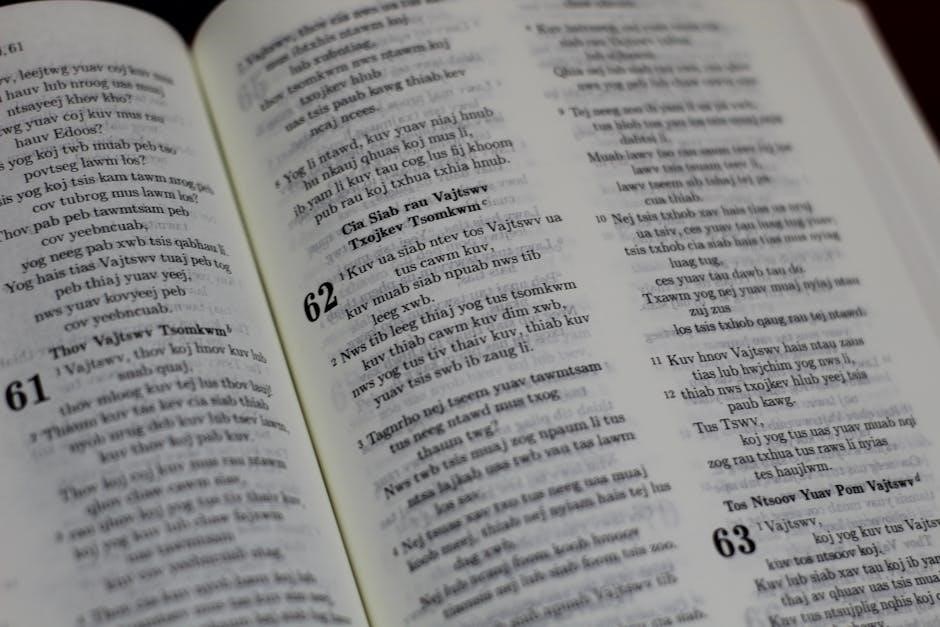the lord’s prayer study guide pdf

The Lord’s Prayer study guide offers a structured approach to understanding this sacred prayer, breaking it down into meaningful sections for deeper spiritual reflection and growth;

Historical Background of the Lord’s Prayer
The Lord’s Prayer originates from Jesus’ teachings in the New Testament, specifically in the Gospels of Matthew and Luke, serving as a timeless model for Christian prayer.
2.1. Origin in the New Testament
The Lord’s Prayer is rooted in the teachings of Jesus Christ, as recorded in the New Testament. It is presented in the Gospels of Matthew and Luke, with slight variations. In Matthew 6:9-13, Jesus provides this prayer as part of the Sermon on the Mount, instructing His disciples on how to pray. Similarly, Luke 11:2-4 records the prayer in response to a disciple’s request to teach them how to pray. These passages emphasize the prayer’s significance as a divine model for communication with God, reflecting Jesus’ emphasis on humility, forgiveness, and reliance on God’s will.
2.2. Key Biblical References (Matthew and Luke)
The Lord’s Prayer is prominently featured in the Gospels of Matthew and Luke. In Matthew 6:9-13, it is part of the Sermon on the Mount, where Jesus teaches His disciples how to pray. Luke 11:2-4 records a similar version, delivered in response to a disciple’s request. Both accounts emphasize the prayer’s structure and spiritual depth. Matthew’s version is slightly longer, including a doxology, while Luke’s is more concise. These passages are foundational for understanding the prayer’s origins and significance, highlighting themes such as reverence for God, the coming of His kingdom, and the necessity of forgiveness. They serve as timeless guides for Christian prayer and devotion.

Breakdown of the Lord’s Prayer
This section explores the prayer’s structure, examining each phrase for deeper spiritual meaning and application, guiding believers in reverence, forgiveness, and aligning with God’s will.
3.1. “Our Father in Heaven”
“Our Father in Heaven” introduces the prayer with intimacy and reverence, acknowledging God as a loving Father who cares for His children. This phrase emphasizes adoption and divine love, reinforcing believers’ identity as God’s chosen ones. It highlights trust and dependence on a Father who provides and protects, blending familial closeness with divine authority. The phrase also underscores God’s transcendence, reminding believers of His holiness and sovereignty. By addressing God as Father, the prayer invites a personal relationship while maintaining awe for His majestic nature. This opening sets the tone for the rest of the prayer, fostering humility, gratitude, and a deep connection with the divine.
3.2. “Hallowed Be Thy Name”
“Hallowed Be Thy Name” is a call to reverence and worship, recognizing God’s holiness and divine nature. This phrase emphasizes the sanctity of God’s name, urging believers to honor and glorify Him above all else. It reflects the Old Testament’s deep respect for God’s name, as seen in Exodus and Isaiah, where His name is revered as sacred. This petition seeks to align human hearts with God’s divine will, fostering a spirit of awe and devotion. By praying “Hallowed Be Thy Name,” believers affirm their commitment to uphold God’s holiness in their lives and actions, striving to reflect His character in a world that often disregards it. This phrase sets the tone for the rest of the prayer, prioritizing God’s glory above personal requests.
3.3. “Thy Kingdom Come”
“Thy Kingdom Come” is a profound petition in the Lord’s Prayer, expressing a deep longing for God’s reign to be fully established on Earth. It reflects a desire for His will to be done universally, aligning human affairs with divine purposes. This phrase encapsulates hope for redemption and the ultimate triumph of good over evil. It is both a future-oriented prayer, anticipating the Second Coming, and a present call to live in accordance with God’s will. By praying “Thy Kingdom Come,” believers acknowledge God’s sovereignty and invite His rule into their lives and the world. This petition inspires trust in God’s plan and encourages active participation in advancing His kingdom through righteous living and service. It is a declaration of faith in God’s ultimate victory and eternal reign.
“Thy Will Be Done” is a humble submission to God’s divine plan, reflecting trust in His wisdom and sovereignty. This phrase emphasizes aligning human desires with God’s intentions, acknowledging His perfect knowledge and loving nature. It is a prayer of surrender, seeking to prioritize God’s purposes over personal agendas. By praying this, believers express willingness to accept His guidance, even in challenging circumstances. This petition fosters a mindset of obedience and reliance on God’s goodness, encouraging a life of faith and trust. It also serves as a reminder of His ultimate authority, inviting believers to embrace His will as their own. This prayer deepens spiritual maturity and strengthens one’s relationship with God. “Give Us This Day Our Daily Bread” is a humble request for God’s provision, reflecting trust in His faithfulness to meet our basic needs. This petition emphasizes reliance on God’s timing and provision, acknowledging His role as the ultimate provider. It teaches dependence on Him for both physical and spiritual sustenance, fostering gratitude and contentment. The phrase also highlights the importance of living in the present, seeking daily bread rather than stockpiling excess. By praying this, believers affirm that true fulfillment comes from God, not material wealth. This prayer encourages a mindset of trust and simplicity, reminding us to prioritize spiritual nourishment alongside physical needs. It is a powerful reminder of God’s care and provision in our lives. “Forgive Us Our Sins” is a heartfelt plea for divine mercy, acknowledging human imperfection and the need for cleansing from wrongdoing. This petition emphasizes the importance of humility and repentance, urging believers to recognize their sins and seek pardon. It reflects the reciprocal nature of forgiveness, as Jesus teaches that God’s forgiveness is linked to our willingness to forgive others. This part of the prayer encourages self-reflection and accountability, reminding us to examine our actions and seek reconciliation with both God and others. By praying these words, we affirm our dependence on God’s grace and mercy, while also committing to extend forgiveness to those who wrong us. This fosters a spirit of compassion and restoration in daily life. “Lead Us Not into Temptation” is a petition for divine protection from situations that may lead to sin or moral failure. This part of the prayer acknowledges human frailty and the ever-present danger of succumbing to evil influences. It expresses trust in God’s sovereignty and His ability to guide believers through life’s challenges. By praying these words, we humbly ask for strength to resist temptation and remain faithful, even in difficult circumstances. This phrase also underscores the importance of relying on God’s grace rather than personal willpower to overcome sin. It serves as a reminder to seek spiritual vigilance and to trust in God’s provision for navigating life’s trials with integrity and faith. “Deliver Us from Evil” is a heartfelt plea for protection from all forms of evil, whether internal struggles, external circumstances, or spiritual forces. This petition acknowledges the reality of evil in the world and our need for divine intervention. It emphasizes trust in God’s power to shield us from harm and corruption. The phrase also reflects a desire to live in accordance with God’s will, free from the influence of darkness. By praying these words, we seek not only deliverance but also the strength to overcome evil’s grip. Ultimately, it expresses faith in God’s triumph over evil and His promise to bring believers into eternal light and peace. This prayer is a declaration of reliance on His sovereignty and grace. The Lord’s Prayer holds profound theological significance, emphasizing God as Father, the Kingdom’s establishment, divine will, and human submission, while highlighting forgiveness and deliverance from evil. The Lord’s Prayer begins with “Our Father in heaven,” establishing God as a loving, paternal figure. This title reflects intimacy and adoption, as seen in Ephesians 1:3-6, where believers are adopted as God’s children. The prayer emphasizes reverence, as God is “hallowed,” yet approachable, highlighting the balance of divine sovereignty and personal relationship. This perspective fosters trust and submission, encouraging believers to seek guidance and provision from a Father who cares deeply. The concept of God as Father is central to Christian theology, shaping prayer, worship, and daily life with a sense of divine love and authority. The phrase “Thy Kingdom come” in the Lord’s Prayer reflects a profound theological theme: the establishment of God’s divine rule on earth. This petition emphasizes the longing for God’s will to be fully realized, mirroring His authority in heaven. The Kingdom of God represents both a present reality and a future hope, where believers experience His reign through obedience and prayer. It underscores the idea of living under God’s sovereignty, aligning human life with His purposes. This concept is central to Christian theology, highlighting the tension between the “already” and the “not yet” of God’s Kingdom, inspiring believers to pray and work toward its fulfillment. The phrase “Thy will be done” encapsulates the essence of human submission to God’s divine plan. It reflects a deep trust in God’s sovereignty and wisdom, acknowledging that His will is perfect and for our ultimate good. This petition calls believers to align their desires with God’s purposes, fostering a mindset of surrender and obedience. By praying “Thy will be done,” we recognize that God’s ways are higher than ours, and we commit to following His lead in all aspects of life. This submission is not passive but active, requiring faith and a willingness to trust in His goodness, even when His will is not immediately clear. “Thy will be done” becomes a powerful expression of devotion and reliance on God’s divine plan. The Lord’s Prayer holds significant cultural and denominational importance across various Christian traditions. In Catholicism, it is often recited during the Mass, emphasizing communal worship. Protestant denominations frequently use it in personal devotion and sermons, highlighting its teachings on forgiveness and surrender. The Orthodox Church incorporates it into liturgical prayers, blending it with other biblical chants. Culturally, the prayer’s themes of divine sovereignty and human reliance resonate universally, transcending linguistic and geographical boundaries. Its simplicity and depth make it a unifying element in global Christianity, while its interpretation and emphasis vary, reflecting the diversity of faith communities. This diversity enriches its relevance, ensuring its enduring impact across cultures and denominations. This step-by-step guide helps individuals and groups explore the Lord’s Prayer deeply. Begin with daily reading and reflection on each verse, using provided commentary. Dedicate one day to understanding the historical context and another to discussing its theological significance. Incorporate group activities, such as creating art or writing personal prayers inspired by the text. Practical exercises include reciting the prayer in different settings and journaling about its application in daily life. Weekly discussions can focus on specific themes, fostering community and shared growth. This structured approach ensures a comprehensive and meaningful study experience, enhanced by downloadable resources like reflection worksheets and study notes. Engage deeply with the Lord’s Prayer through practical exercises designed to enhance spiritual growth. Begin with daily journaling, reflecting on how each phrase applies to your life. Create art or music inspired by the prayer’s themes, exploring creativity as a form of worship. Participate in group discussions, sharing insights and personal experiences. Use reflection prompts, such as “What does it mean to call God ‘Father’?” or “How can I seek God’s will daily?” Incorporate prayer practice, reciting the prayer in different settings to observe its impact. Conclude with a week-long challenge to apply the prayer’s teachings in daily actions, fostering a deeper connection with its message. The Lord’s Prayer is deeply rooted in biblical teachings, with key verses in Matthew 6:9-13 and Luke 11:2-4 serving as its foundation. Additional references include Psalm 103:1 for praising God, Proverbs 30:8 for trusting in divine provision, and 1 John 1:9 for forgiveness. Ephesians 6:18 encourages persistent prayer, while Matthew 26:41 highlights the importance of resisting temptation. These verses provide a biblical framework for understanding the prayer’s themes of reverence, kingdom-focused living, and trust in God’s will. They also emphasize the prayer’s relevance to daily life and spiritual growth. For deeper exploration, numerous resources are available to enhance your understanding of the Lord’s Prayer. The Dig for Kids offers a child-friendly approach, while Luther’s Small Catechism provides theological insights. The ACTS Prayer Guide Template and Franciscan prayer courses add practical and devotional perspectives. Websites like selectlearning.org and cofewinchester.contentfiles.net offer downloadable study guides and worksheets. These resources cater to diverse learning needs, from personal devotion to group Bible studies, ensuring a comprehensive and enriching experience for all who seek to deepen their faith and prayer life through the Lord’s Prayer.3.4. “Thy Will Be Done”
3.5. “Give Us This Day Our Daily Bread”
3.6. “Forgive Us Our Sins”
3.7. “Lead Us Not into Temptation”
3.8. “Deliver Us from Evil”

Theological Significance
4.1. God as Father
4.2. The Kingdom of God
4.3. Divine Will and Human Submission

Cultural and Denominational Perspectives

Step-by-Step Study Guide

Practical Exercises and Reflections

Related Bible Verses and References

Resources for Further Study
Leave a Reply
You must be logged in to post a comment.